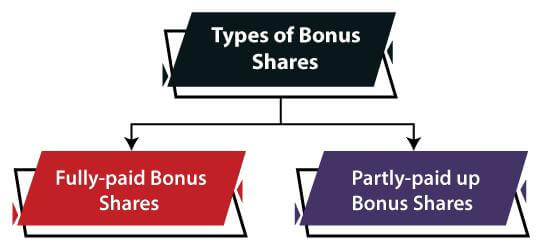Bonus Issue of SharesWhat are Bonus Shares?Bonus shares refer to those additional shares which are given by the company to its existing shareholders or investor in the form of a "BONUS" in such a case when the company doesn't want to distribute the dividend in the form of cash even after having enough amount of profit. Only those companies have the right to issue the bonus shares which have earned large profits or have large free reserves that the company can't utilize for any other purpose. 
Shareholders are also allowed to sell these shares whenever required. A point should be noted here that there is no tax charged on bonus shares but it can be charged on a shareholder in the form of capital gains tax if he/she sells them at a net gain. What is a Bonus Issue?Issuing the bonus shares to the shareholders is known as the bonus issue of shares. The companies issue these shares in case of a shortage of cash or if the companies want to hold the whole profit for future growth while shareholders are expecting a regular income from the company. The companies also issue bonus shares to restructure their reserves. The issue of bonus shares has no effect on the company's liquidation and hence there is no change in the company's net assets but it increases the share capital of the company. However, the shareholders get these bonus shares as per their existing stake in the company. These shares also don't dilute the shareholders' equity because they are issued in a constant ratio that keeps the shareholders' equity the same as it was. For example, if a company issues one for three bonus shares, then it means an existing shareholder will get three additional bonus shares for every existing share of his/her stake. So, in this sense let us assume a shareholder holds 3,000 shares of a company. Now, when the company will issue a bonus share to that existing shareholder, he/she will receive 1,000 bonus shares, i.e., (3,000*1/3 = 1,000). Types of Bonus SharesBonus shares can be divided into the following two types: 
1. Fully-paid Bonus SharesThe bonus shares that are distributed without any additional cost in the proportion of the shareholders holding in the company are known as fully-paid bonus shares. Fully-paid bonus shares can be issued through the following sources:
2. Partly-paid up Bonus SharesThe partly-paid shares are those shares that are partially paid in comparison to the full issue price. It means these shares can be bought without paying the whole issue price. However, the investor can pay the remaining amount in installments when the company makes the calls. So in this sense, when the partly-paid shares are converted into fully-paid shares after applying bonus in them and without calling out the uncalled installments through profit capitalization then these shares are called partly-paid up bonus shares. However, these shares cannot be issued from a security account or capital redemption reserve account. Why do companies issue Bonus Shares?Bonus shares are issued to the shareholders when the company wants to retain the profit for future growth and development and don't want to distribute it as dividend among the shareholders. Bonus shares help the company in retaining its goodwill in the market because if a company does not distribute dividends among the shareholders even after earning a sufficient profit then the shareholders may lose their belief in the company which can be laid down its prestige in the market. The process of issuing bonus shares to the existing shareholders is also known as capitalization of profits because the company issues them out of its profit or reserves. Conditions for Issue of Bonus SharesThere are certain prerequisite conditions given below that are required to be fulfilled before issuing bonus shares:
Eligibility for Bonus SharesOnly those shareholders are eligible to get bonus shares from the company who own the company's shares before the ex-date and record date. In our country, the delivery of shares is done on the basis of the T + 2 rolling system where the record date is two days after the ex-date. Shareholders are required to buy the shares before the ex-date because if the shareholders will buy the shares on the ex-date then they will not get the ownership of the shares and therefore they can't get the benefit of bonus shares. Once the shareholder gets a new ISIN (International Securities Identification Number), the bonus shares will be credited to his/her account within 15 days. Procedure for Issue of Bonus ShareThere are several steps that the company should follow while issuing the bonus shares. These steps are given below: 1. Call a Board MeetingThe first step that is taken in the process of issuing bonus shares is to call for a board meeting. The notice must be issued at least seven days before the meeting of the Board of Directors, as per Section 173(3) of the Act. 2. Convene a Board MeetingThe second step in this process is to conduct the board meeting and present the agenda in front of the directors. But there are certain points that should be ensured before conducting the meeting:
3. Circulate Draft MinutesThe next step is to circulate the draft minutes to all directors of the board for their comments within the stipulated time. In the case of a public company, it is mandatory to file the board resolution in the form MGT - 14 with the Registrar of Companies within 30 days. 4. Send Notice of General MeetingThe fourth step is to send the notice for the conduction of the general meeting to all directors, shareholders, auditors, and all the members entitled to receive for approving the issue of the Bonus Shares. For this purpose, they all get a minimum of 21 clear days. 5. Convene the General MeetingIn the fifth step, the extraordinary general meeting is convened to authorize the issue of Bonus Shares by passing an Ordinary resolution as per Section 114(1) of the Act. Now the Board also approved the issue of Bonus Shares. 6. Convene a Board MeetingAfter it, a Board meeting is again convened by the company to get the approval for the allotment of the Bonus Shares and to follow all the required protocols for this purpose. 7. File Form No. PAS-3Then the return of allotment is filed in the Form PAS-3 within 30 days of the allotment of Bonus Shares by the company. Along with this, some other documents or attachments are required which include the following:
8. Issue of Share CertificatesThe last step in this process is to inform the depositors (those who will get the Bonus Shares) immediately about the allotment of the shares when they are in the Demat account. The company must issue the share certificates within 2 months from the date of allotment if the shares are allotted in the physical form. Advantages of Bonus IssueFrom the Investor's View Point
From the Company's View Point
Disadvantages of Bonus IssueFrom the Investor's View Point
From the Company's View Point
Next TopicTypes of Shares
|
 For Videos Join Our Youtube Channel: Join Now
For Videos Join Our Youtube Channel: Join Now
Feedback
- Send your Feedback to [email protected]
Help Others, Please Share










